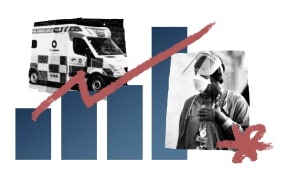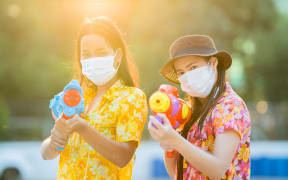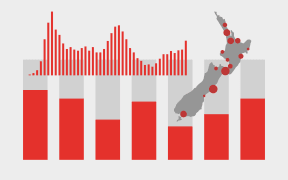
Ministry of Health deputy director-general Dr Andrew Old says around one million eligible people over the age of 18 are yet to get a first booster. Photo: RNZ / Angus Dreaver
As the busy Christmas holiday period approaches, health experts are urging people to do what they can to help protect themselves from Covid-19.
Vaccination booster rates have flatlined despite the country experiencing its third wave of Omicron.
Ministry of Health deputy director-general Dr Andrew Old told Morning Report many of those eligible for Covid-19 boosters had not yet taken up the opportunity to have them.
Around one million eligible people over the age of 18 were yet to get a first booster, he said, and 800,000 of those eligible for a second booster also had not done so.
He said the benefits of vaccination were two-fold, helping to protect both the individual and the wider community.
"It helps protect us as a community, and that's by getting high rates of vaccination across the board, and it protects you as an individual - particularly against severe disease."
Vaccination also helped keep pressure off hospitals, Old said.
"The real focus is on making sure that everybody who is eligible for at least one booster has got it ... that's a Christmas present you can give yourselves."
Everyone aged 50+, Māori and Pacific people over the age of 40 and those with certain other comorbidities are eligible for a second booster."
"Now is a really, really good time to help protect yourself for summer and get those boosters if you're eligible."
Old said a person's immunity against infection with Covid-19 began to wane about two or three months after they had received a dose, but the protection vaccination provided against severe disease and death did seem to last a lot longer.
"Your first two (primary) doses plus the booster is the magic in terms of protection from severe disease from Covid."
While the overall rate of reinfections was still sitting around 4 percent, the mix of variants driving this wave of infections meant the percentage of reinfections as a proportion of daily case numbers had ramped up in recent weeks.
"Reinfections are definitely rising," he said.
"We've got this mix of new variants coming in which just means that people are more likely to get reinfected with a new variant."
People who had contracted the virus should still get any boosters they were eligible for, Old said, though they should wait three months after their infection to ensure their immune system had time to recover.
There was no plan to roll out a third booster dose over the summer period, he said, but work was being done to look at running another campaign around vaccination ahead of winter 2023.
Summer in the time of Covid-19
Old recommended people stock up on free RATs (rapid antigen tests) and masks before the summer holidays to ensure they were prepared should they get sick over the festive season.
"Whether you're staying at home or going away, do it early ... so that if you do start to feel unwell you've got them on hand and you don't have to have that added pressure of going out and finding them when you're feeling unwell."
Antivirals could not be stocked up on in advance, he said, because the focus was on having them easily available when people needed them.
"If you do develop Covid and you upload your positive test to the system, then you can access antivirals without seeing a GP, without a prescription."






